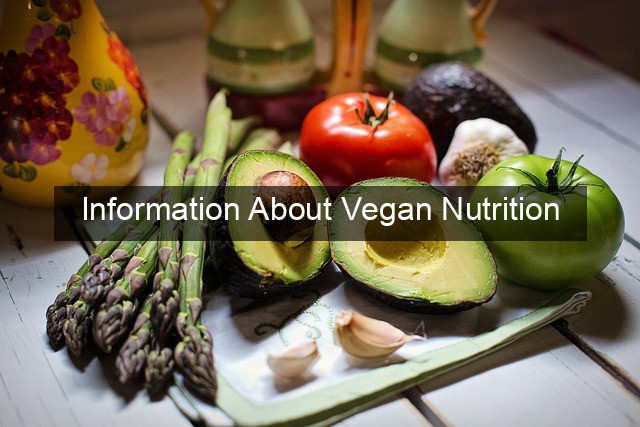Information About Vegan Nutrition

- Information About Vegan Nutrition
- A Comprehensive Guide to Vegan Nutrition
- Essential Nutrients for Vegans
- Protein Powerhouses
- The Importance of Iron
- Calcium for Strong Bones
- Planning a Balanced Vegan Diet
- Meal Prepping for Success
- Reading Food Labels Wisely
- Creative Vegan Cooking
- Addressing Common Concerns about Veganism
- Vitamin B12 Supplementation
- Omega-3 Fatty Acids
- Conclusion
- Frequently Asked Questions about Vegan Nutrition

A Comprehensive Guide to Vegan Nutrition
More than a dietary choice, veganism represents a commitment to a compassionate and sustainable lifestyle. It involves abstaining from all animal products, including meat, poultry, fish, dairy, eggs, and honey. But navigating the world of plant-based eating can feel overwhelming, especially when considering nutritional needs. This guide offers a deep dive into the essentials of vegan nutrition, providing the information you need to thrive on a plant-based diet. From understanding key nutrients to meal planning and addressing common concerns, we’ll equip you with the knowledge to make informed choices and embrace the many benefits of veganism.
Essential Nutrients for Vegans
Protein Powerhouses
Protein is crucial for building and repairing tissues, and contrary to popular belief, plant-based diets can be abundant in this vital nutrient. Excellent sources include legumes like lentils, chickpeas, and beans, as well as tofu, tempeh, edamame, and quinoa. Nuts and seeds also contribute to protein intake. Combining different plant-based protein sources throughout the day ensures you receive all the essential amino acids your body requires.
Diversifying your protein sources is key to maximizing nutrient absorption and overall health. Experimenting with different legumes, nuts, and seeds can add variety and flavor to your meals. Consider incorporating protein-rich ingredients into every meal and snack.
Tracking your protein intake, especially when transitioning to a vegan diet, can be helpful. While strict calorie counting isn’t necessary for everyone, being mindful of your protein sources can ensure you’re meeting your body’s needs.
The Importance of Iron
Iron is essential for red blood cell production and oxygen transport. While meat is a well-known source of iron, plant-based options like leafy greens, beans, lentils, and fortified cereals are also excellent choices. Pairing iron-rich foods with vitamin C-rich foods enhances absorption. For instance, combining spinach with a squeeze of lemon juice can optimize iron uptake.
Iron deficiency can lead to fatigue and anemia, so it’s crucial for vegans to prioritize iron-rich foods. Including a variety of these foods in your daily diet can help maintain healthy iron levels.
Consulting with a healthcare professional or registered dietitian can help you determine your individual iron needs and develop a personalized plan to meet those requirements.
Calcium for Strong Bones
Calcium plays a vital role in bone health, nerve function, and muscle contraction. While dairy is often associated with calcium, plant-based alternatives abound. Leafy greens like kale and collard greens, fortified plant milks, tofu, and calcium-set tofu are excellent sources. Including these foods regularly contributes to strong bones and overall well-being.
Choosing calcium-fortified foods can be an easy way to boost your intake. Check labels to ensure you’re selecting products that provide a significant amount of calcium.
Sunlight exposure also plays a role in calcium absorption by promoting vitamin D synthesis. Spending time outdoors can contribute to overall bone health.
Planning a Balanced Vegan Diet
Meal Prepping for Success
Planning your meals in advance is a valuable strategy for maintaining a balanced vegan diet. Preparing meals ahead of time not only saves time and effort but also helps ensure you’re consuming a variety of nutrient-rich foods. Batch cooking grains, legumes, and vegetables can simplify meal assembly throughout the week.
Creating a weekly meal plan can eliminate the guesswork of what to eat each day. This can also help you diversify your food choices and ensure you’re incorporating all the essential nutrients.
Investing in reusable containers for storing prepped meals and snacks makes it easy to grab and go, supporting a healthy and convenient lifestyle.
Reading Food Labels Wisely
Becoming familiar with food labels is essential for navigating the world of packaged foods. Checking labels allows you to identify hidden animal products, added sugars, and unhealthy fats. Paying attention to serving sizes and nutrient content empowers you to make informed choices that align with your dietary goals.
Understanding the different names for common allergens and animal products can prevent accidental consumption. This is particularly important for individuals with allergies or strict dietary preferences.
Comparing labels of similar products can help you identify the healthiest options based on factors like nutrient density, added sugars, and sodium content.
Creative Vegan Cooking
Embracing veganism opens up a world of culinary possibilities. Experimenting with different cuisines, flavors, and ingredients can make plant-based eating an exciting and enjoyable experience. Exploring vegan cookbooks, online recipes, and cooking classes can expand your culinary repertoire and inspire creativity in the kitchen.
Learning to substitute common animal products with plant-based alternatives can simplify the transition to veganism. For example, using flaxseed meal as an egg replacement in baking can produce delicious and satisfying results.
Don’t be afraid to get creative with spices and herbs to enhance the flavor of your vegan dishes. Experimenting with different flavor profiles can make plant-based meals even more appealing.
Addressing Common Concerns about Veganism
Vitamin B12 Supplementation
Vitamin B12 is primarily found in animal products, making supplementation crucial for vegans. This essential nutrient plays a vital role in nerve function and red blood cell production. Regular B12 supplements, either through oral tablets or injections, ensure adequate intake and prevent deficiency.
Consulting with a healthcare professional can help determine the appropriate dosage and form of B12 supplementation based on individual needs.
Understanding the importance of B12 supplementation is crucial for maintaining optimal health on a vegan diet.
Omega-3 Fatty Acids
Omega-3 fatty acids are essential for brain health, heart health, and reducing inflammation. While fish is a common source, vegans can obtain these beneficial fats from plant-based sources like flaxseeds, chia seeds, hemp seeds, and walnuts. Including these foods regularly contributes to overall well-being.
Adding ground flaxseed or chia seeds to smoothies, oatmeal, or yogurt is an easy way to boost your omega-3 intake.
Algae-based omega-3 supplements are also available for those who prefer a supplemental form.
Conclusion
Embarking on a vegan journey is a rewarding experience that offers numerous benefits for both personal health and the planet. By focusing on consuming a variety of nutrient-rich plant-based foods, vegans can thrive and enjoy a vibrant and fulfilling lifestyle. With careful planning and a commitment to understanding nutritional needs, a vegan diet can be a sustainable and healthy choice for individuals of all ages.
Remember, transitioning to a vegan lifestyle is a process, and it’s okay to seek guidance and support along the way. Connecting with online communities, attending vegan events, and consulting with registered dietitians can provide valuable resources and encouragement. Embrace the journey, and enjoy the abundance of delicious and nutritious plant-based foods available.
Frequently Asked Questions about Vegan Nutrition
- Q: Can children thrive on a vegan diet? A: Yes, children can thrive on a well-planned vegan diet. It’s essential to ensure they receive adequate amounts of key nutrients like protein, iron, calcium, vitamin B12, and omega-3 fatty acids.
- Q: Is a vegan diet expensive? A: Not necessarily. Focusing on staple foods like beans, lentils, rice, and seasonal produce can make vegan eating affordable.
- Q: Where can I find vegan recipes? A: Numerous online resources, cookbooks, and blogs offer a wealth of delicious and easy-to-follow vegan recipes.
- Q: How can I get enough protein on a vegan diet? A: Plant-based protein sources like legumes, tofu, tempeh, quinoa, nuts, and seeds provide ample protein when incorporated into a balanced diet.
| Nutrient | Vegan Sources |
|---|---|
| Protein | Beans, lentils, tofu, tempeh, quinoa, nuts, seeds |
| Iron | Leafy greens, beans, lentils, fortified cereals |
| Calcium | Leafy greens, fortified plant milks, tofu, calcium-set tofu |



